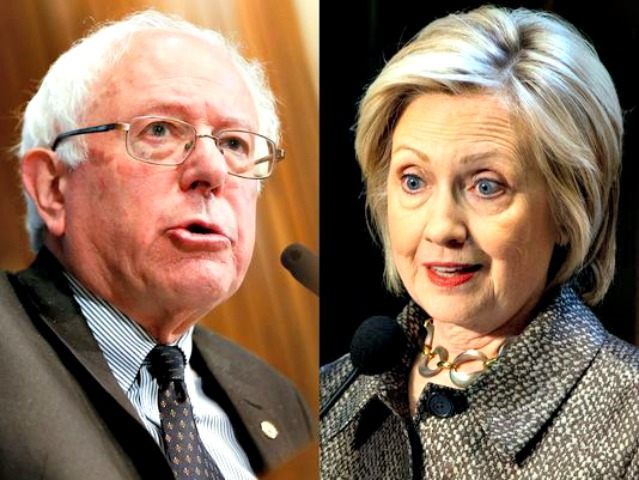A new Quinnipiac poll finds Sen. Bernie Sanders, the self-proclaimed socialist from Vermont, leading presumed frontrunner Hillary Clinton by one point in Iowa. Sanders has the support of 41 percent of likely caucus voters, Hillary 40 percent and Vice President Joe Biden receives 12 percent. This poll puts Sanders ahead of Clinton in both early voting states, Iowa and New Hampshire.
The Sanders surge is fueled by two factors. He is viewed by Democrats as more honest and more concerned about their problems. Only 64 percent of Democrats view Clinton as “honest and trustworthy.” Almost one-third, 30 percent, say she isn’t honest. In contrast, 86 percent of Democrats say Sanders is honest.
Sanders also wins the empathy question, meaning voters think he cares about their needs and problems. Sanders has a 20 point edge over Clinton on this somewhat ambiguous, but critical, question. Sanders’ numbers are 85-5 on this, while Clinton is just 78-18. It should be a five-alarm warning for the Clinton camp that almost 1-in-5 Democrats think she doesn’t care about their needs.
It is worth remembering that in 2012, exit polls showed Mitt Romney topped Barack Obama on every issue except one; empathy. Obama’s reelection was fueled in large part because voters believed he cared more about their problems than Romney.
Voters will not elect a candidate who they don’t trust or isn’t empathetic to their lives.
Another factor is fueling Sanders rise in Iowa, though. Among Democrats who describe themselves as “very liberal,” Sanders leads Clinton by 30 points, 59-29. Caucus voters, even more so than primary voters, tend to be far more liberal than the general Democrat electorate.
Attending a caucus requires far more commitment than voting in a primary. There is no early or absentee voting. You have to publicly declare your support. The time commitment to participate in a caucus can be at least one hour, but it often runs far longer. Sanders’ overwhelming advantage among the most liberal Democrats would give him a clear edge in the caucuses.
It is worth remembering that Clinton came in third in Iowa in 2008. She finished behind Obama, as well as former Sen. John Edwards.
The Quinnipiac poll is especially interesting because it doesn’t seem as if the Democrat electorate is rushing to “outsider” candidates as the Republican voters are.
Three-quarters of Democrat voters prefer a candidate with experience in government over experience in business. An overwhelming majority, 69 percent, would prefer a candidate with experience in Washington, rather than experience outside of D.C. Only a third of Democrats would prefer a candidate whose political experience was mostly outside of Washington.
Democrats and Republicans, in fact, do look at the world very differently.
The growing Democratic rejection of Clinton isn’t some protest against what they see as the Washington “establishment.” The move away from Clinton is particular and specific to her. A large number of Democrats simply don’t like her that much. Sanders has an almost 20 point advantage over Clinton on basic favorablity.
Pundits may dismiss the polls showing Clinton’s weakness by noting that the vote in Iowa is still five months away. That is certainly true, however, frontrunners are supposed to dominate polling this far out from an election. Clinton has saturated the airwaves in Iowa with early campaign ads. Sanders hasn’t aired a single ad in the Hawkeye State.
Insurgent candidates usually peak on election day, after months of grueling leg-work and grass roots organizing. They do not generally lead polls five months out from an election.
Clinton, who has been a national political figure for more than 20 years and has every possible advantage enjoyed by frontrunners, now finds herself having to regroup and fight to reclaim the advantage in Iowa. That is an almost impossible task.

COMMENTS
Please let us know if you're having issues with commenting.